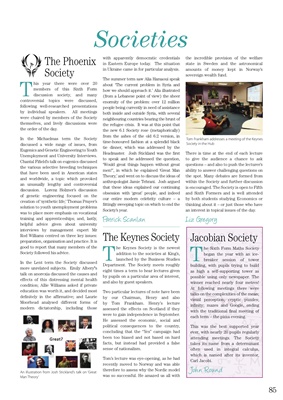
The Phoenix
Society
This year there were over 20
members of this Sixth Form
discussion society, and many
controversial topics were discussed,
following well-researched presentations
by individual speakers. All meetings
were chaired by members of the Society
themselves, and lively discussions were
the order of the day.
In the Michaelmas term the Society
discussed a wide range of issues, from
Eugenics and Genetic Engineering to Youth
Unemployment and University Interviews.
Chantal Fifield's talk on eugenics discussed
the various selective breeding techniques
that have been used in American states
and worldwide, a topic which provoked
an unusually lengthy and controversial
discussion. Lorenz Holzner's discussion
of genetic engineering focused on the
creation of 'synthetic life;' Thomas Prayer's
solution to youth unemployment problems
was to place more emphasis on vocational
training and apprenticeships; and, lastly,
helpful advice given about university
interviews by management expert Mr
Rod Williams centred on three key issues:
preparation, organisation and practice. It is
good to report that many members of the
Society followed his advice.
In the Lent term the Society discussed
more unrelated subjects. Emily Albery's
talk on anorexia discussed the causes and
effects of this distressing mental health
condition; Allie Williams asked if private
education was worth it, and decided most
definitely in the affirmative; and Laurie
Moorhead analysed different forms of
modern dictatorship, including those with apparently democratic credentials
in Eastern Europe today. The situation
in Ukraine came in for particular analysis.
The summer term saw Alia Hamaoui speak
about 'The current problem in Syria and
how we should approach it.' Alia illustrated
(from a Lebanese point of view) the sheer
enormity of the problem: over 12 million
people being currently in need of assistance
both inside and outside Syria, with several
neighbouring countries bearing the brunt of
the refugee crisis. It was at this point that
the new 6.1 Society rose (metaphorically)
from the ashes of the old 6.2 version, in
time-honoured fashion at a splendid black
tie dinner, which was addressed by the
Headmaster. Josh Stickland was the first
to speak and he addressed the question,
'Would great things happen without great
men?', in which he explained 'Great Man
Theory,' and went on to discuss the ideas of
anthropologist Jamie Tehrani. Josh argued
that these ideas explained our continuing
obsession with 'great' people, and indeed
our entire modern celebrity culture - a
fittingly sweeping topic on which to end the
Society's year.
Patrick Scanlan
The Keynes Society
The Keynes Society is the newest
addition to the societies at King's,
launched by the Business Studies
Department. The Society meets roughly
eight times a term to hear lectures given
by pupils on a particular area of interest,
and also by guest speakers.
Two particular lectures of note have been
by our Chairman, Henry Dufosee, and
also by Tom Frankham. Henry's lecture
assessed the effects on Scotland if they
were to gain independence in September.
He assessed the economic, social and
political consequences to the country,
concluding that the "Yes" campaign had
been too biased and not based on hard
facts, but instead had provided a false
sense of nationalism.
Tom's lecture was eye-opening, as he had
recently moved to Norway and was able
therefore to assess why the Nordic model
was so successful. He amazed us all with the incredible provision of the welfare
state in Sweden and the astronomical
amounts of money kept in Norway's
sovereign wealth fund.
There is time at the end of each lecture
to give the audience a chance to ask
questions - and also to push the lecturer's
ability to answer challenging questions on
the spot. Many debates are formed from
within the Society and further discussion
is encouraged. The Society is open to Fifth
and Sixth Formers and is well attended
by both students studying Economics or
thinking about it - or just those who have
an interest in topical issues of the day.
Liz Gregory
An illustration from Josh Stickland's talk on 'Great
Man Theory'
Societies
Tom Frankham addresses a meeting of the Keynes
Society in the Hub
Jacobian Society
The Sixth Form Maths Society
began the year with an icebreaker session of tower
building, with pupils trying to build
as high a self-supporting tower as
possible using only newspaper. The
winner reached nearly four metres!
At following meetings there were
talks on the complexities of the mean;
visual perception; cryptic puzzles;
infinity; mazes and Google, ending
with the traditional final meeting of
each term - the pizza evening.
This was the best supported year
ever, with nearly 20 pupils regularly
attending meetings. The Society
takes its name from a determinant
often used in integral calculus,
which is named after its inventor,
Carl Jacobi.
John Round
85